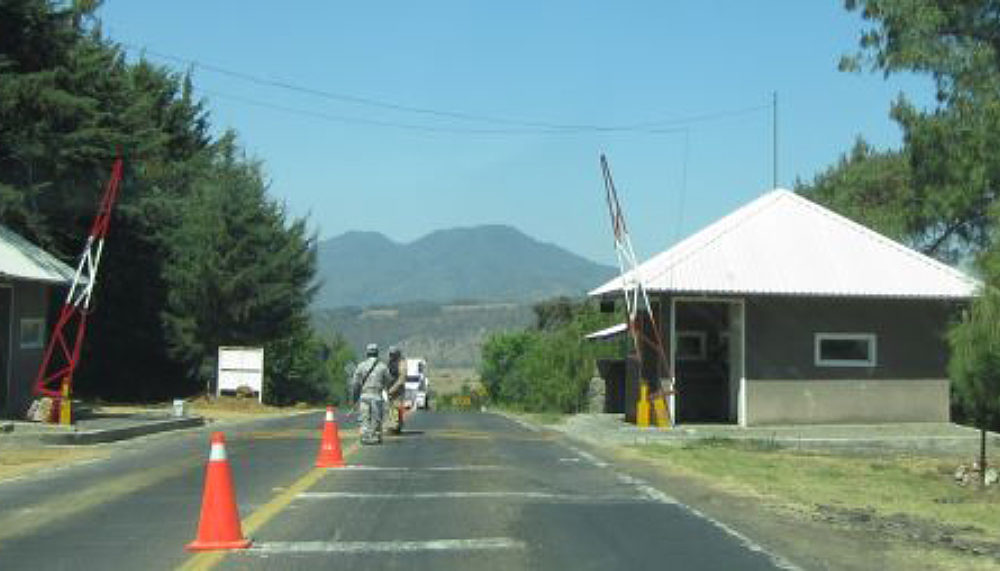PAST PROJECT
Non-state security provision and rural policing in southern Mexico

This project explores alternative forms of security provision in rural areas of southern Mexico that emerged as responses to criminal violence and the failure of the state to defend its citizens.
Timeframe: 2019 - 2020
This qualitative study contributes to a mixed-method research project on “Rural Policing in Southern Mexico” at the Poverty, Violence and Governance Lab (PovGov, at the Freeman Spogli Institute of International Studies, Stanford University). Beatriz Magaloni (Senior Fellow at the Freeman Spogli Institute for International Studies Professor of Political Science) directs the PovGov Lab and the overall Rural Policing research project.
The Rural Policing Project aims to understand alternative forms of security provision in rural areas of southern Mexico that emerged in recent years as responses to criminal violence and the failure of the state to defend its citizens. These alternative forms of security provision include communal police forces in indigenous areas or different autodefensa groups in non-indigenous areas. Some have been temporarily or permanently formalised and operate with a basis in law while others remain informal. The study seeks to understand how these non-standard police forces (in the following non-government police, NGP) operate, relate to other police forces and to their communities and how they are perceived by the populations of these communities. Within the conflict transformation research tradition at Berghof, the project picks up on investigations of non-state armed groups and their perceived legitimacy in a variety of conflict settings, most recently in Afghanistan.
The qualitative research component carried out by the Berghof Foundation is funded by Stanford University and should contribute to the overall research by describing the social and ethnographic context in which non-standard police forces operate. The qualitative data help in the design of the quantitative survey, by proposing possible causal mechanisms for the emergence of trust in local NGP forces and by generating hypotheses for statistical testing. Geographically, the study focuses on two southern Mexican states, Michoacán and Oaxaca.
Background
Since President Felipe Calderon initiated the War on Drugs in 2006 by sending 1,500 Mexican Army troops to the state of Michoacán, violence levels in the country have soared. Virtually no part of Mexico has been left unaffected by the escalating violence. The Mexican state’s inability to offer protection to the population and the frequent collusion of state security forces with criminal groups led to increasing frustration within the population. As a result, civilians increasingly began to take security provision into their own hands. As of 2013, self-defence groups were operating in 13 Mexican states and at least 68 municipalities. Since then their number has likely increased further.
Turning to the southern Mexican state of Michoacán, one of the geographic foci of the Rural Policing Project, a first movement emerged in the indigenous Purépecha community of Cherán (Michoacán), which in 2012 rebelled violently against the criminal governance imposed on their town by the Knights Templar criminal syndicate. Later, other Purépecha communities followed suit. Inspired by the example of the Purépechas, in February 2013 non-indigenous communities of the Tierra Caliente region of Michoacán State “rose up” against the Knights Templar setting up autodefensa formations. This latter vigilante movement gained broad visibility through the coverage of its struggle by international and national media.

The Mexican state’s reactions to the emergence of the different forms of non-government police forces (NGPs) in Michoacán has been contradictory and generally incoherent ranging from close covert and overt cooperation, over integration and containment to suppression. As a result, one can find a very large number of different types of NGP formations. On the one hand, there are different informal vigilante groups in indigenous and non-indigenous communities. This differentiation is important as the informal internal governance structure of indigenous and non-indigenous communities differ greatly, with the former usually allowing for stronger communal control of local vigilante groups than the letter. Formal PNGs also differ greatly. For example, some of the original autodefensas entered in 2015 the so-called Policía Estatal Fuerza Rural (State Police Rural Force), which was specially created to integrate informal autodefensas. In other cases, the state police directly integrated local autodefensa groups, providing them with training, uniforms and salary. However, contrary to normal state police officers, these ex-autodefensa turned state police troopers are not rotated but remain in their communities basically continuing to act as local vigilantes – but now with state police uniforms and receiving salaries. After the dissolution of the Fuerza Rural in 2017, many autodefensas also entered the state police of Michoacán under similar arrangements. In yet other cases, indigenous communities enjoying a special status (e.g. Cherán and Pichátaro) have officially set up their armed and uniformed police forces, which are on the payroll of their municipality and are not part of the state police forces.
The situation in Oaxaca State is very different from that of Michoacán. While opium poppy and marijuana cultivation are widespread in the remote mountains and while Oaxaca is also important as a transshipment route, visible criminal cartel presence and overt criminal violence remains relatively limited in this state. However, Oaxaca differs from Michoacán not just regarding the degree of visible criminal presence and the level of criminal violence, but also regarding the modalities of local governance. In 1995, Oaxaca legalised in its new Constitution traditional forms of indigenous governance called usos y costumbres. Usos y costumbres is a form of direct democracy that bans political parties in local elections and provides security locally via unpaid and only lightly armed (batons) communal police structures (mostly referred to as topiles). Due to the deteriorating security situation, many indigenous communities now opt to establish, in addition to traditional topiles, also armed and uniformed municipal police forces. These municipal police forces, however, appear to operate under unofficial arrangements that are very different from those of ordinary municipal police structures.
Stanford University’s Rural Policing study seeks to understand how NGPs operate, relate to other police forces and to their communities and how they are perceived by the populations of these communities.
Approach
The qualitative component of the overall Rural Policing study implemented by the Berghof Foundation applies an Institution Centred Conflict Research (ICCR), a methodology developed by the Free University Berlin and the University of Bielefeld (for more on the methodology click here). ICCR aims to understand institutions and social structures via the analysis of conflicts. As part of this approach, the Berghof Foundation’s researcher trains students from Michoacán and Oaxaca in qualitative research methods and provides them with analytical tools to investigate conflicts. After the five-day training, the investigators set out – under the guidance of the project leader from the Berghof Foundation – to conduct interviews and observations in selected rural research locations of Michoacán and Oaxaca. After a six to seven weeks long field research period, the researchers come together for a final workshop (foreseen for the end of November), where the principal investigators from Stanford University and the Berghof Foundation debrief them.
The students are offered opportunities to publish working papers using their field research data on the Stanford University project website.
Aim and outcomes
The overall goal of Stanford University’s Rural Policing project is the diagnosis and analysis of the emergence and articulation of community police, “autodefensas” and vigilante justice in southern Mexico. The qualitative research component carried out by the Berghof Foundation is funded by Stanford University and contributes to the overall research by describing the social and ethnographic context in which non-standard police forces operate, by helping in the design of the quantitative survey, by proposing possible causal mechanisms for the emergence of trust in local NGP forces and by generating hypotheses for statistical testing. Geographically, the study focuses on two Southern Mexican states, Michoacán and Oaxaca.
The concrete outcomes of the project are up to 400 qualitative interviews as well conflict case studies from the selected field research locations in Michoacán and Oaxaca. The interview transcripts will be NVIVO-coded for further analysis. Joint publications are foreseen for the future.
Partners and funding
The project is funded by the Stanford University’s Poverty, Violence and Governance Lab (PovGov, at the Freeman Spogli Institute of International Studies). Beatriz Magaloni (Senior Fellow at the Freeman Spogli Institute for International Studies Professor of Political Science) directs the PovGov Lab and the overall Rural Policing research project.
Media contact
You can reach the press team at:
+49 (0) 177 7052758
email hidden; JavaScript is required


